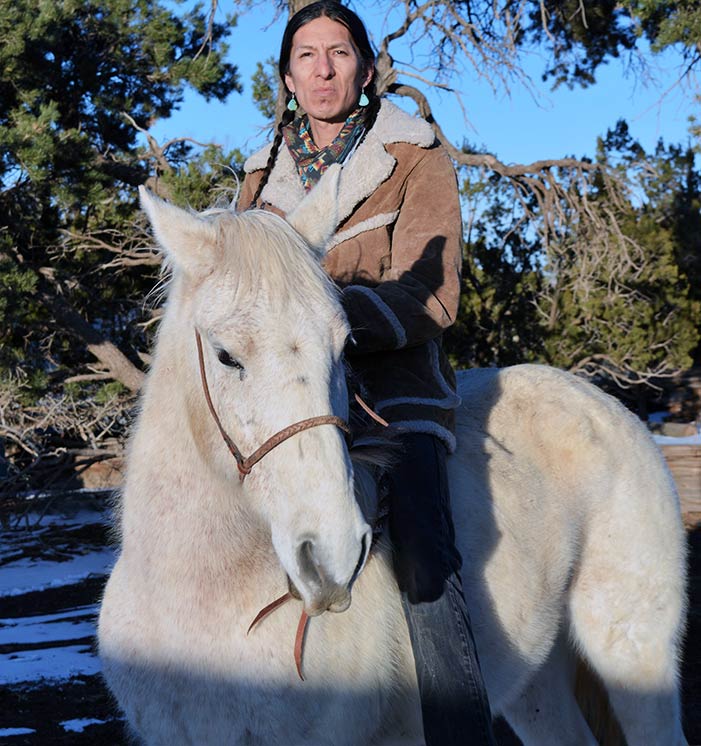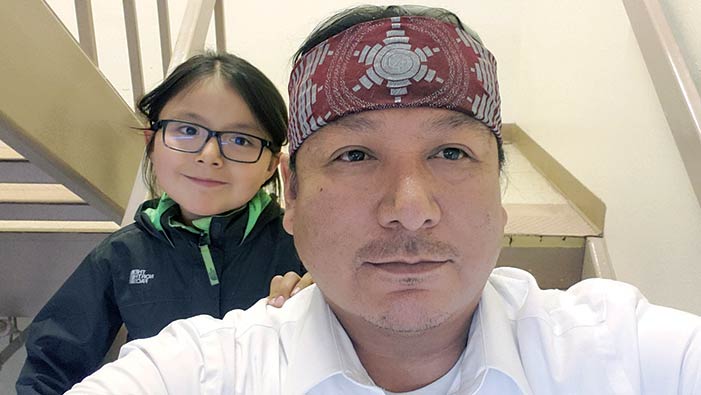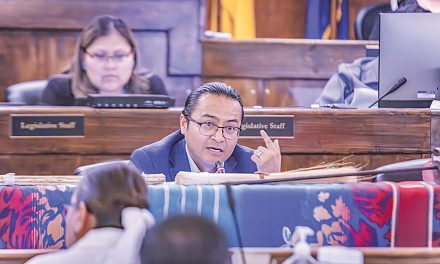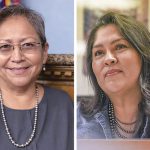
Surviving the coronavirus crisis: Diné perspectives
Part 1 in a series
WINDOW ROCK
In speaking with members of the Navajo Nation regarding their preparations for weathering the coronavirus pandemic, common factors have emerged: a need to return to traditional ways, with a focus on K’e and T’áá hwó ají t’éego, to protect families and elders, and take care of our Mother Earth.
Many have suggested that this is a time to stock up and stay home and to rest, reflect, and embrace traditional knowledge and practices that have sustained Diné through many past existential threats and periods of hardship.
Clayson Benally – ‘That may be our lifeline’
“The place we’re at today is 102 years from the 1918 Spanish flu pandemic and my family would not be here today if it wasn’t for my grandma Zonnie Benally,” said Clayson Benallly.
Before the outbreak of the flu, Zonnie Benally, who was a medicine woman and a hand trembler, was given a warning in the form of a saddle on a horse that mysteriously caught on fire even though it wasn’t near a fire.
The burning saddle was interpreted as a sign that a flu that was coming, a sickness that would correlate with a meteor shower, and that by eating horse meat their health would be boosted.
“By eating the horse that would give them the necessary strength to fight off the sickness and stay healthy,” said Clayson.
As a public service, the Navajo Times is making all coverage of the coronavirus pandemic fully available on its website. Please support the Times by subscribing.
How to protect yourself and others.
Why masks work. Which masks are best.
Resources for coronavirus assistance
Zonnie Benally and her family travelled the region and warned everyone about the flu. They told people how to prepare and what to expect.
They said to stay away from people and go away into isolation, except for going out with the sheep and animals, and to wash hands and cleanse thoroughly.
“Not everyone listened,” said Clayson. “The people that didn’t prepare this way passed.”
“The World Health Organization is telling you to prepare,” said Clayson. “We have the information ahead of time. It’s a blessing. We should definitely heed those warnings.”
Clayson says he finds it amazing that his grandmother’s recommendation from 100 years ago is exactly the same as what WHO is recommending now — avoid contact with people and isolate.
In some ways, by doing so, people can also refocus on their health and well-being.
“They can enjoy being home and become resilient and stronger because of these adversities,” he said.
He says as a Nation we have to do our best to protect the elders.
“Our elders are so precious to us,” he said. “Anyone with a conscience should protect our elders and our most vulnerable.”
Clayson’s father Hataalii Jones Benally has stayed prepared because of past events, he says.
“This is exactly why my father has kept our sheep, our cows, our horses,” said Clayson. “This is everything that our elders prepared us for. We’re fortunate we didn’t sell everything off, because now we’re in a situation where that just may be our lifeline.”
The traditional culture has always been part of Diné health care system, he said.
“Before there were hospitals, there were medicine men and women,” he said. “Our lifestyle is preventative — living off the land, living close to nature.”
Eugenia Charles-Newton – ‘Walking the walk’
Along with several delegates who recently travelled to Washington, D.C., Eugenia Charles-Newton said she decided to self-isolate for 14 days. She says it’s the protection of the elders she’s thinking about most.
“Even though we feel fine, it’s a precautionary measure,” she said. “If we can limit contact and limit how this virus is transferred, we should be taking every measure to do that. As leaders we shouldn’t just be talking the talk, we should be walking the walk.”
Charles-Newton says she has faith and confidence in the traditional practitioners who are taking the necessary steps to try to pray for the people.
“There are a lot of ceremonies that have been going on,” she said.
While she normally participates in regular sweats that strengthen her, she says right now she’s practicing her traditions at home.
“We burned cedar when I came home and we prayed as a family,” she said.
Charles-Newton says the elders have recommend the healing properties of blue corn mush and her husband said it’s time to start hunting again to get meat.
“It’s come to that point where we have to think about these things,” she said.
Charles-Newton’s grandmother used to say if we don’t take care of this earth, there would be consequences and an attempt to restore balance.
“I remember elders talking about something that was going to be in the air that was going to infect the elements,” she said. “They said the sickness is going to be in the air.”
Charles-Newton says some of elders are now saying, “This is it — this is what we were warned about.”
“It’s coming to light now. We have this knowledge and these medicines,” she said. “They said we’re all going to have to come together and share our knowledge and go back to the earth healing us.”
She reflects back on how resilient the elders are and what they’ve gone though.
“We survived because of our traditional knowledge and because of what we knew at the time,” she said.
Emery Denny – ‘K’é is going to be our strength’
Emery Denny’s grandfather told him you should never feed your fear, because that’s how it grows.

Navajo Times | Rima Krisst
Clayson Benally with his horse Moonwalker.
“Don’t feed the coronavirus fear,” said Denny. “Instead, pray about it.”
Denny, a Marine Corps veteran and son of Hataalii Avery Denny, said, “I’m trying to use this negativity to propel me and my family forward. The energy can consume you or you can use it for your benefit.”
He believes preparation can be empowering and go a long way towards alleviating fear.
“I think a lot of times we get dependent on the system that’s in place and it’s been a long time since that’s been disrupted,” said Denny. “People who are prepared aren’t as panicked.”
Because of our reliance the market economy, many Navajos stopped planting, he said.
“Agriculture and horticulture have gotten away from us and that was something that made us a truly sovereign nation not too long a go,” he said. “We were economically, physically, and spiritually sovereign so we didn’t live in fear.”
Additionally, he says, people have become specialized in their vocations and have let go of secondary skills that offer a lot of flexibility, especially in a time like this.
“I’m using this time time teach my son more about being independent, self-sufficient,” said Emery Denny. “And seeing this as a great lesson to say, ‘Don’t depend on Walmart to get everything in life — some things you’re going to have to grow for yourself, make for yourself.”
Denny says he and his son will plant a garden again this year.

Courtesy photo | Emery Denny
Emery Denny and his son, Hozhonie Love Denny.
“It’s important to me that my son grows up knowing there’s a source of food and income at home,” he said. “I want him to know that there is a certain stability in traditional living.”
He says these teachings at young age instill a value system, because you’re tied to the land, the weather.
“These things used to be common knowledge,” he said.
He says if we all help each other and look out for the elders, everything will be all right.
He encourages everyone to go back to the basics and what they already know, including T’áá hwó ají t’éego and K’é.
“K’é is going to be the biggest currency and K’e is going to be our strength,” said Denny.
With regard to cultivating self-sufficiency, he says, it begins with yourself.
“We use our traditional knowledge to proactive about about our physical and spiritual health,” he said.
Getting up early in the morning, praying, running and looking for opportunities to make the most of life are a good way to start every day, he said.
It’s also important to try to spread a little humor.
“Humor is actually a real big component of healing,” he said. “Our corn also plays a role. All these things are used as part of our medicine.”
He encourages everyone to find the good parts in the situation we’re in.
“It’s a blessing in disguise if you look at it with the correct lens,” he said.
For example, he says, some of you are going to have time with your children that you’ve wished for.
“I just told my son Navajo culture just got extended to the whole day instead of one hour,” chuckled Denny.
Nathanial Brown – ‘We are her children’
Delegate Nathanial Brown believes an event like the coronavirus crisis has the power to bring people back together.
“Maybe the Holy People are telling us it’s time to go home,” he said. “Spend time together — you’re children are hurting, you’re grandmas are hurting.”
Ultimately, we’re in a day and age when people can connect so quickly but where they are the most lonely, he said.
“Our spirituality is nature and when we’re out of balance, this is what happens,” he said. “The way to rebalance is we need to continue to say our prayers and make offerings.”
Brown’s grandmother says we need to go back to farming and growing our own food, and eating horse meat, rich in antibodies.
“Our health has been compromised,” he said.
We can’t be lazy, gluttonous or prideful anymore, he says.
“We’ve been letting the materialistic things dictate our life,” he said. “Money has become our religion.”
Brown’s grandmother told him that when the world comes to using only one language, we will see the end of things.
“The diversity is so important,” he said. “The beauty of the world is that we’re all so different. We’re supposed to appreciate our differences.”
Brown says once we disobey natural laws, we can be expecting phenomenons like the coronavirus.
“Mother Nature is responding to us,” he said. “When she is stressed she wants to cleanse herself.”
“We are her children. Have we been treating her right?,” he asks.
Brown points to the greed that drives the ever constant extraction of natural resources.
“There’s a reason why oil, coal uranium are buried,” said Brown. “We are surface people. Everything we have on the surface is more than enough for us to live.”
The truth is that we’ve been hurting that which feeds and shelters us, he said.
“We’re burning fuel at such a tremendous rate. We’re creating trash. The top soil is eroding. We’re contaminating it with pesticides and chemicals,” he said.
“Mother Earth is telling us we need to change, we need to do something,” said Brown.
Maybe this coronavirus is a blessing in disguise, he says. Perhaps, in fact, this is what we prayed into being.
“What if our prayers are literally being answered?,” he asks.
“What I know for sure is that there is no amount of darkness or evil that can put out the light, the goodness, and the love that there is,” said Brown.
Thomas Walker Jr. – ‘That’s the prescription’
“I think all this humbles us and reminds that we’re all equally vulnerable,” said Delegate Thomas Walker.
An event like the coronavirus crisis is a great equalizer in that way, he said.
“We’re all defenseless with something like this,” he said.
Walker believes it’s important to pay attention to the micro-world, including viruses and bacteria and the “unseen, unheard, faceless, and bodiless” entities in addition to the macro-world of the universe, where we pay attention to the moon, the sun, the earth, the sky and the stars.
“As Navajos we believe all of these are living entities,” said Walker. “They have identity, characteristics, and purpose in our lives.”
As human beings we live in-between along with plants, insects, animals, in the chain of living beings that we’re a part of, he said.
“If we really want to be in a good place, a safe place, we must recognize that we are only a small part of that cosmic order,” he said. “It’s time to pay attention with reverence and respect and honor all living things,” he said. “Everything has a history and an origin.”
He said in order to safely coexist, we need to understand the nature and the power of all living things.
“We must not violate or harm any of them,” he said.
“That’s the Navajo belief,” he said. “There are consequences if you disrupt or disturb living entities — their lives, their peace, their Hozho.”
Walker suggests that events like the coronavirus outbreak could be a repercussion for disturbing that peace or harming the environment.
“The earth takes care of us very well, almost in a perfected way,” said Walker. “But sometimes we forget that or take it for granted.”
He said that the precautionary quarantine and self-isolating measures remind him of steps in the healing process.
“You need that time and that space all to yourself,” he said. “You need to settle down and settle in and take your daily routine, your concerns, and your pursuits off your mind and focus on your well being. You have to stay close to home. That’s the prescription.”
Jonathan Perry – “Respecting natural laws’
“Growing up, we were told that Diné need to constantly be aware of the things that are changing and are going to impact the way we live and balance our existence,” said former Delegate Jonathan Perry.
He says in 2003-05, the elders said we would be going through something soon and Navajo Nation should be prepared.
“A lot of folks were concerned that we were not holding ourselves accountable and respecting natural laws,” said Perry.
They predicted that because many ignore or have forgotten aspects of fundamental law an imbalance would occur and in order to regain our balance this type of issue, such as coronavirus, would come about.
“Due to things we’ve been doing to the earth, the sky and and elements that we identify in our creation stories and our songs and prayers, we have tended to take it for granted and lost that connection to our roots,” said Perry.
He said right now reconnecting with those roots would be very important as are the practices of T’áá hwó ají t’éego and K’é.
Perry says he’s practicing social distancing.
Isolation is important, because the more we limit interaction, the more we can slow down the virus, he said.
“We also need to control our fear,” he added. “We should be aware of the dangers and conscious of how to protect ourselves, but we don’t want to hurt ourselves either, to the point where we can’t sleep or eat for worry.”
On a positive note, Perry feels a strong sense of community emerging.
“People are saying, ‘We’ve got to go back to growing are own food, we’ve got to to be self-reliant,’” he said.
Perry says those things help us refocus on what’s important here at home and stay grounded.
“We are a strong people,” said Perry. “We can get through this. We just have to remember who we are.”
Note: This will be an ongoing series as we move through the coronavirus pandemic. Contact rkrisst@navajotimes.com if you would like to share your perspective.








 Highway 264,
Highway 264, I-40, WB @ Winslow
I-40, WB @ Winslow